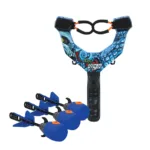by JEREMY PADAWER, Chief Brand Officer, Jazwares
1. Vision requires EVOLUTION or CHANGE.
There is no static vision in a world constantly evolving around an organization. Sameness over time leads to stagnation and decline.
2. Vision requires KNOW-HOW.
Know-how isn’t necessarily experience. Know-how is the ability to execute with the experience of others. If you know how to develop a team of complementary skillsets around a core objective, you can execute against a vision — even if you lack most of the requisite experience. I’ve known people in the toy business with five years of experience who intuitively understand how to build teams around a common goal; I’ve known brilliant strategists with decades of experience who can’t. Know-how is greatly underrated.
3. In some businesses, vision requires SUBJECT MATTER PASSION.
The case study of toys resembles that remark. The largest toy companies evolve in a somewhat predictable manner.
1) Early visionaries run the business for a time creating brands, developing franchises, establishing credibility and/or licensing opportunities with other intellectual property (IP) owners, and acquiring smartly. These companies are known for their rapid ascent and remarkable ability to recreate themselves.
2) At some point there is a changing of the guard — either to someone internally who has identified themselves as excellent at execution or externally to someone who is known as an operator. Big decisions are made creatively that fail — and the company suffers in its ability to recreate itself.
3) The third generation of management comes in focusing on process and operations, and for a time, this works. Profits improve. Processes improve. But this, too, is not an era of creativity. The second generation of management confused tactical or operational ability with vision. The third generation of management had vision but lacked subject matter passion.
4) The best case scenario for this organization is a fourth-generation visionary with subject matter passion ushering in a time where creativity rules again but couched within the lessons learned from process and operational excellence.
4. Vision requires SELF-REFLECTION.
Without constant self-reflection, a company loses sight of core competencies. Movement into adjacent areas of business is fair play. If you’re a toy company with specific expertise in manufacturing and sourcing, the right additional teammates can execute against a vision of adjacencies — AKA entering into categories of manufacturing stuff. Essentially… If you’re a cat, use your claws, your cunning, your ability to move quietly, pivoting on a dime… but no matter how much you want to bark, it’s not happening. You’re going to meow every time.😻
5. Vision requires CONSTITUTION.
What’s happened in the rearview mirror only offers a clue to the next move. Do not confuse a scholar with a soothsayer. Relying on the past requires limited constitution.
And that’s my definition of vision. ❤️
Here’s to our careers!


